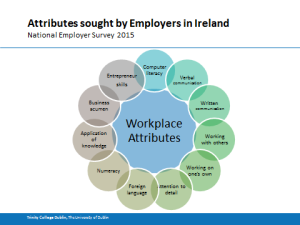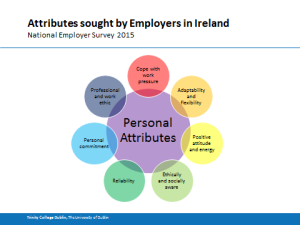Remember the joke? ‘What do you say to an arts student with a job? Cheeseburger and chips please’. As an employer, however, you’d be foolish to disregard an applicant who has a background in the humanities. Here’s why.
What use is an arts graduate to your business? Traditional thinking suggests an employer would be better served by someone with a degree in business, maths, science, engineering or technology, due to their more distinct ‘skill sets’. Increasingly, however, firms are headhunting humanities grads, because people with backgrounds in subjects like philosophy, history, and English can bring something new and valuable to their workplace.
What bosses want
Experts believe the arts opens up a host of opportunities for graduates. “Graduates of the arts and humanities offer employers wide-ranging transferable skills and are equipped with more than enough to succeed in the professional world,” says Orlaith Tunney from the TCD career advisory service.
Tunney points to the National Employer Survey 2015, where Irish employers listed the workplace attributes and personal attitudes they look for in their staff. Skills like communication (written and verbal) and foreign languages ranked as highly as numeracy and business acumen while positivity and being ethically and socially aware were also called out as desirable. Tunney notes that these are traits that can all be honed over the course of an arts degree, alongside the personal development that comes with studying something you love.
Arts students can develop most of the skills Irish employers say they want. But why hire one over a business or science graduate? It seems that what can set an arts grad apart is not just his or her training, but the way they look at the world. “They are better equipped to use their imagination and challenge conventional wisdom,” says Tunney. “The independent study of the arts helps build resilience to deal with a rapidly changing world, the versatility and non-vocational nature of research is directly applicable to the world of work”.
Blue sky thinking
In particular, it’s been banks and tech companies snapping up arts graduates. The feeling among firms is that these grads possess more creative and critical thought processes and are less prone to tunnel vision than their counterparts from more technical backgrounds.
Tim Skeet, a former managing director at RBS and currently a board member of the International Capital Market Association, graduated from University with a degree in modern languages. When asked about RBS’ hiring strategy by The Times in 2014 he said: “We need input from people who have left-field, blue-sky creative thinking, who can bring the ability to ask the tough questions”.
Meanwhile, Steve Jobs, who took classes in English and calligraphy, firmly believed that technology needed to be linked to the arts to be successful. “Technology alone is not enough … it’s technology married with liberal arts, married with the humanities; that yields the results that make our hearts sing,” he said.
Six reasons to hire an arts grad
We’ve heard in general now about the unique benefits an arts graduate can bring to a company. But what are the specific abilities these job seekers possess? Here we list the top six.
1: Translation of ideas
Arts graduates are trained to study large chunks of information and big ideas, spot the critical issues and construct a logical argument and draw conclusions. Where a company deals in complicated financial or technical jargon, someone with the ability to translate this information effectively to shareholders, customers, etc. can be invaluable.
2: Problem solving
While a mathematician or engineer might see things in black and white, someone from the arts is less likely to suffer from tunnel vision. Taught to believe there is never one right answer, they are more liable to consider a wider range of options in a given situation.
3: Understanding the customer
Technical knowledge is crucial when designing a technical or financial product, but it can’t help you understand human nature or what it is that people want. More people-orientated by nature, humanists have an important part to play when a company is trying to grasp the nuances that surveys and market research can’t pick up.
4: Adaptability
While finance or tech people will typically focus on one discipline in their studies, arts graduates tend to look at a variety of subjects, from literature to languages, from philosophy to fine art. This makes them adaptable and able to move between different roles in an organisation, grappling with new information and responsibilities quickly and efficiently.
5: People Skills
Humanists tend to be sociable by nature. They usually work well in teams and build good professional relationships with people, both internal and external. The value of their communication skills should not be undervalued.
6: Creativity
Creative by nature, arts grads are less likely to go with the flow of existing structures and more liable to consider doing things a different way. Hiring someone who is prepared to ditch conventional wisdom and consider “What if did this differently?” is more likely to lead to more innovative ideas and outcomes for your company.
Did we leave anything out? You can Tweet us @thinkbusinessie if you have a suggestion.
Article by Peter Flanagan. Thanks to Orlaith Tunney and the TCD career advisory service for contributing. Main image Shutterstock. Other images from the National Employer Survey 2015. ⊕









